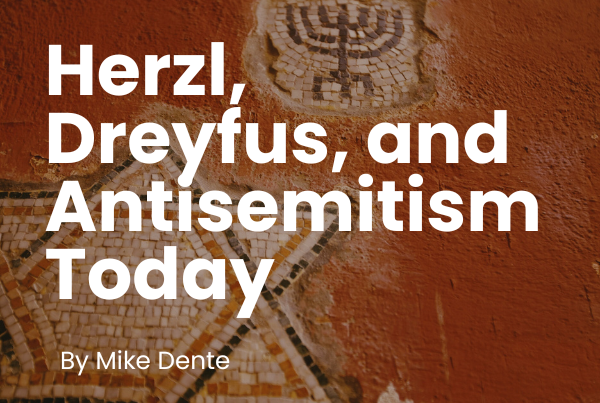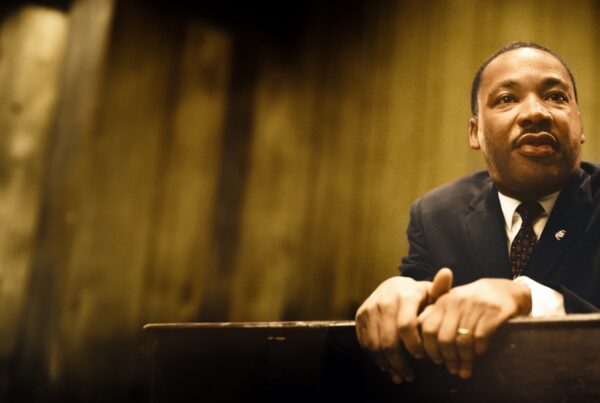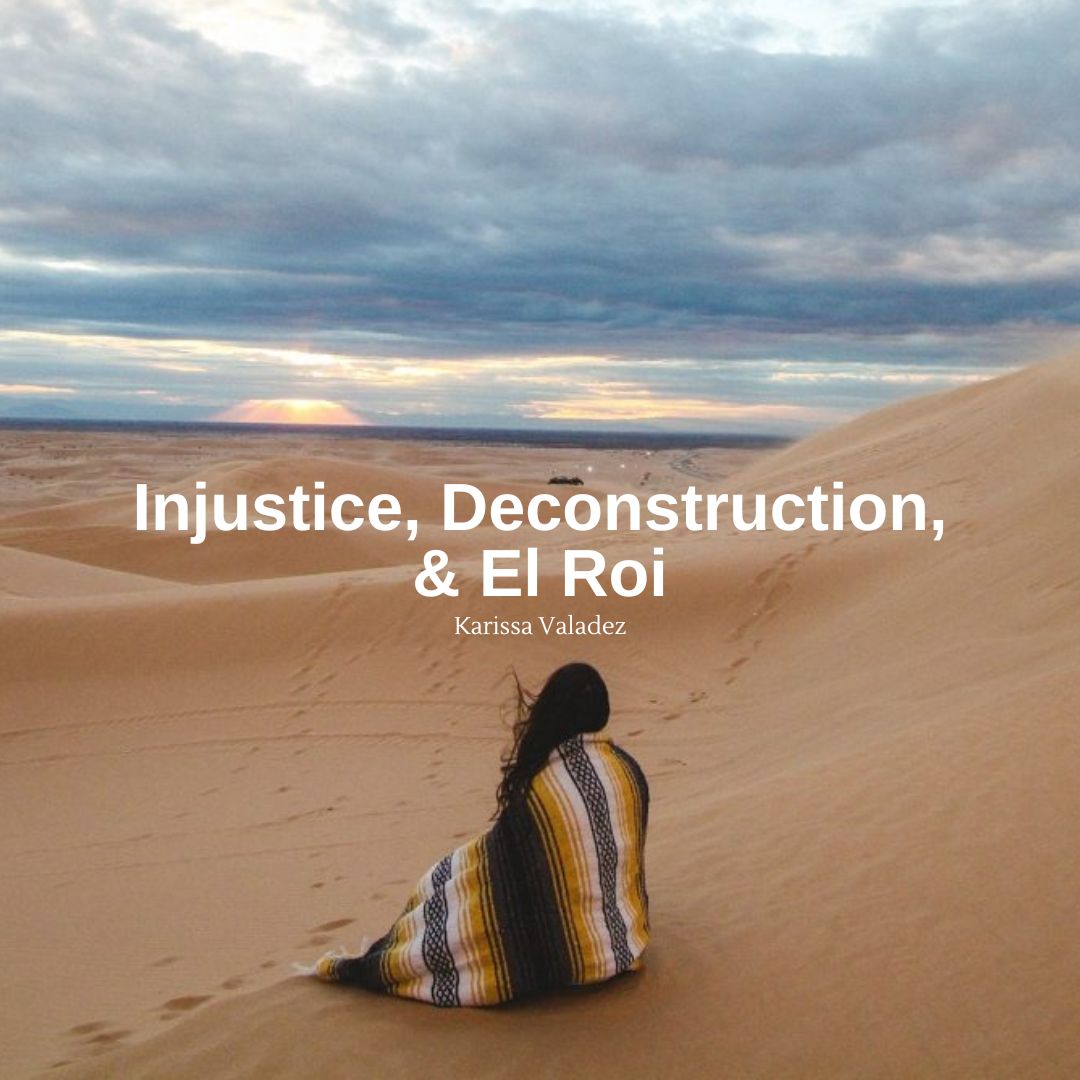
In the 2001 cult classic Zoolander, Will Farrell plays Mugatu, the movie’s antagonist. This evil villain of the fashion world, who intends to use male models as super soldiers by means of hypnotism, repeats his iconic line in multiple scenes throughout the film. In each instance, Mugatu, with his tightly curled hair piled absurdly high onto each side of his head, leans over to one of his latex-clad henchmen and shouts in a slightly Germanic accent, “that Hansel is SO hot right now.”
Well it is the year 2023, and to borrow the words of Mugatu: Deconstruction is SO hot right now.
Now this article will not be another criticism of the ever growing popularity of deconstruction. The path of deconstruction can produce differing potential outcomes. I admit that one direction of deconstruction can lead to the complete dissection of the Christian faith, and unravelment of all belief and trust in Jesus. The theological word for this is apostasy.
The camp of deconstruction holds many apostates who both celebrate and encourage the total abandonment of conviction in Christ. This is not something to take lightly; it is a tragedy. We grieve for those who once found life in the Light and experienced the warmth of Christ’s presence, only to reject Him and the work of the cross, which was nothing short of the greatest revolution this earth and the heavens have ever seen.
However, we cannot allow ourselves to demonize deconstruction as a whole.
Another path of deconstruction can lead to the refinement of one’s faith.
Throughout history, church culture has taken on many statutes and edicts that were based not on biblical principles, but on the opinions of man. The requirement for women to wear dresses or skirts to church; the belief that percussion instruments, drums for example, are the tool of Satan; … or the egregiously false ideology that Black skin originated from the mark of Cain, thus justifying chattel slavery, the transatlantic slave trade, and all the horrors and crimes against humanity that followed.
These are just a few of the distorted dogmas that were once popularized within mainstream church over various generations; these we now understand to be in complete contradiction to the message of the gospel. It was by deconstructing the status quo of church culture at the time, and comparing these misconceptions against Scripture that Christians of the past were able to discern between the will of God and the presumptions and prejudices of man.
I propose that the same is taking place in 2023. To be clear, I am not making the case that engaging in the Christianity debate on Twitter and TikTok is equivalent to the life’s work of Christian abolitionists such as Ottobah Cugoano or Frederick Douglass. But we ought to be capable of identifying the norms and practices that have slipped their way into our churches that do not reflect the heart of God.
We must understand the difference between deconstructing the word of God, and deconstructing the culture of church.
Those who are deconstructing their faith are not our enemies, and often, their journey is a reaction to the misrepresentation of Jesus that they have experienced within the church. Spiritual abuse, nepotism, greed, unfettered pride, and sexual misconduct run rampant within church leadership today, and it has not gone unnoticed.
When earnest believers witness their church’s haste to cover up a pastor’s sin, when young girls have it ingrained into their heads that the highest value that they have to offer God (and their future spouse) is directly attached to their virginity, when brothers and sisters in the church turn on one another because their love for a political party supersedes their love for the Body, we are left with a mass of confused and hurting individuals.
Right now there is an abundance of articles, podcasts, documentaries, and even social media pages that are dedicated to exposing hypocritical, damaging, and even predatory behaviors within churches that have long been swept under the rug.
What the deconstruction movement has shown us is that there is a multitude of former believers carrying the pain of church hurt, and many have turned their backs on Christ as a consequence of the failures of man.
We all live in this fallen world that has been devastated by sin, which is evidenced by the immeasurable injustices suffered by millions. The question of how a good God allows such affliction and desolation in the world is one that has been asked by many throughout history, and a quick Google search, or trip to Kindle Books will produce content and writing that has been dedicated to answer this very inquiry.
However, there is a question in the hearts of those burdened with profound wounds that were inflicted not by cancer or war, human trafficking or poverty, but by pastors, leaders, and very body of believers that were intended to carry one another’s burdens. The question being: Where is God when injustice happens in the church?
I invite you to look with me at Genesis 16 and 21. If you are familiar with Abraham and Sarah, then you probably know of the promise that God made to Abraham: that through him, God would bring forth a nation of His chosen people. The One whom angels describe as the LORD God of Hosts and King of Glory looked upon the faithfulness of Abraham and chose to make a covenant to provide descendants to a childless, despairing man. What follows in the wake of this incredible, hope-filled promise of a miracle becomes a travesty and a miscarriage of justice.
When sinful and fallible humans attempt the work of God through their own measures, relying on the strength of their own hands, or an agenda of their own making, what often follows is pain.
An Injustice in Genesis
In verse one of Genesis sixteen, Sarah hears of the promise that God made to Abraham and immediately takes matters into her own hands. Rather than trusting in the Lord to fulfill His word, she schemes to achieve the results that she desires within a time frame that suits her. Sarah offers for Abraham to sleep with her maidservant, Hagar, in order to conceive a child by proxy. Such was common practice during this time; later in Scripture, Rachel will use this very same method with Jacob and her maidservant, saying to him, “… here is my maid Bilhah; go in to her, and she will bear a child on my knees, that I also may have children by her” (Genesis 30:1).
Yet, we know that just because something is socially common or accepted does not make it right in the eyes of God. For instance, slavery in the United States lasted for over two centuries. It was certainly widely practiced, and it was an affront to the heart of God. Likewise, the impact that Sarah’s actions had on the trajectory of Hagar’s life was a gross perversion of the life-giving, hope-inspiring promise God had made.
Hagar was originally from Egypt, and biblical scholars believe that she was one of the many slaves Pharaoh gave to Abraham (then Abram) back in Genesis 12:16. We cannot be sure of her age, only that she was in childbearing years, which would have been considered anywhere from twelve to twenty or so. She also spent ten years in the desert with Sarah and Abraham, from the point of leaving Egypt to the time of Sarah’s disastrous decision, so it is likely that she would have been on the older side of that spectrum. Either way, she was young and she was a slave.
The very connotation of being a slave removes the possibility of choice. She was given, sexually, to Abraham without her consent. Hagar, a young girl subjected to the humiliating and dehumanizing process of being bought and sold as property, is now further disregarded in her humanity as she is forced to lay with an eighty-six year old man.
As unpleasant as it is to dwell on this portion of Scripture and all that it implies, let us remember that this was a real person, with thoughts, feelings, and hopes of her own. Notice that Abraham never took Hagar as a proper wife to be loved, protected, and regarded with honor. Rather she is treated as a concubine. Hagar’s body and her womb are used by Abraham and Sarah for their own purposes yet she never even receives her freedom in exchange: she remains Sarah’s servant. Only God Himself knows the tears Hagar may have cried that night and the nights that followed.
In verse four of Genesis sixteen, Hagar becomes pregnant, and here she begins to show contempt towards Sarah. Which comes as no shock. Perhaps Hagar felt herself superior to Sarah since she could conceive a child and Sarah could not, as many have taught it so. Alternatively, Hagar may have believed that carrying Abraham’s child gave her some sort of protection to finally express a disdain that existed due to the mistreatment she had suffered. Whatever the case may be, Sarah’s response to Hagar’s defiance is merciless.
When Sarah approaches Abraham blaming him for the catastrophe they had both created, Abraham shirks the responsibility to right his wrongs, instead he tells Sarah that Hagar is her maid, and to do with her as she pleases. The Bible tells us that Sarah then deals harshly with Hagar. There is no further clarification on Sarah’s methods, but the Hebrew word used here for harshly is ānâ. Various applications for this words would be: to inflict, use force, to humiliate, or to be weakened.
Commentators have suggested a few different possibilities for Sarah’s course of action. Perhaps Hagar was overworked and worn down past the point of exhaustion. Food deprivation is also probable, and of course, there is potential that Sarah beat Hagar. We will never know the exact details of what transpired between these two women, but it’s important to understand that the author’s decision to include the word ‘harshly’ to describe Sarah’s treatment strongly suggests the implication of abuse.
Sarah was not simply unpleasant or over authoritative with Hagar.
She tormented Hagar, a young pregnant girl to such lengths, that Hagar ran into the wilderness, desperate to escape Abraham and his wife. Consider with me for a moment, what suffering Hagar experienced at the hands of Sarah, that she would rather risk death in the Arabian desert, than stay one more day under Sarah’s ownership.
The ancient world described in Genesis was ruthless. The story of Sodom and Gomorrah displays the lawlessness and brutality humankind had already begun to descend into. The fact that Abraham had been so crippled in his fear of Pharaoh, that he was willing to preemptively give up his wife in order to avoid death, indicates just how much faith Abraham himself had in the civility of ancient society. The concepts of human rights and equality did not exist; for those who lived in this culture, the only guarantee for one’s safety was power. Of course we know that Abraham had the power of God on his side but in this land where power is king, and in this ancient world full of nations, riches, and pharaohs, the same world where Abraham makes covenants with the Creator and Sarah would entertain angels as house guests, who would ever care for least of these: a lowly pregnant slave, who’s powerlessness is evidenced by how little control she had in the making of her own condition?
It is here, in Genesis 16:7, that the Angel of the Lord appears to Hagar, arriving in the midst of her affliction and her pain. However, this Angel is no ordinary angel, rather it is the pre-incarnate Christ. This. is. Jesus. before He ever stepped down into our world in the form of flesh, walking among us, sharing in the joys and the sorrows of humanity. Centuries before He laid down His life on the cross in order to conquer the hold of sin and redeem mankind back unto Himself, Jesus met a broken and traumatized girl crying in the desert.
The Angel of the Lord asks Hagar where she is from and where she is going. When she tells Him that she is running from her mistress, His response is to instruct her to return and submit herself to Sarah. If one were to end their reading here, it might seem unfair or callous even, for Christ to guide Hagar back to the source of her misery, but God sees the bigger picture that she cannot. God promises Hagar that through the child she carries, He will bring such vast descendants that they would be beyond count.
He then names Hagar’s unborn son Ishmael. This is not just a name but another promise, for the name Ishmael means “God Will See.” Jesus calls Hagar to turn back and rejoin Abraham and Sarah, not because He is blind or indifferent to her abuse, but because He has a plan for her and her son that does not involve her dying in the wilderness. With the very name of her son, He assures her that He sees; He knows the trauma that she has endured, and God Himself is going to watch over her.
In turn, Hagar “calls upon the name of the Lord” in verse 13. This phrase is first used back in Genesis 4:26, describing the descendants of Adam: “And to Seth also a son was born, and he called his name Enosh. At that time men began to call upon the name of Jehovah.” This is the Old Testament way of describing those who put their faith in Yahweh. You see, Hagar’s encounter with Jesus leaves her radically transformed. The Egyptian girl who likely once bowed down to the vain, lifeless idols of Ra, Isis, and Horus, now trusts in the True and Living God. Her faith is her own: it is not a trickle down from her masters or a lip service.
When this young girl, whose life has been filled with nothing but injustice, meets the God of Justice, her distress is turned to praise as she proclaims, “… You are the God Who Sees” or in Hebrew, El Roi ( el-roh-ee).
Hagar returns to Abraham and Sarah’s camp, though she goes knowing that God sees and her confidence is built on the goodness of her God, rather than any fallible human being.
Now, this would be an idyllic place to wrap things up into a tidy little feel good story, but history does not end here.
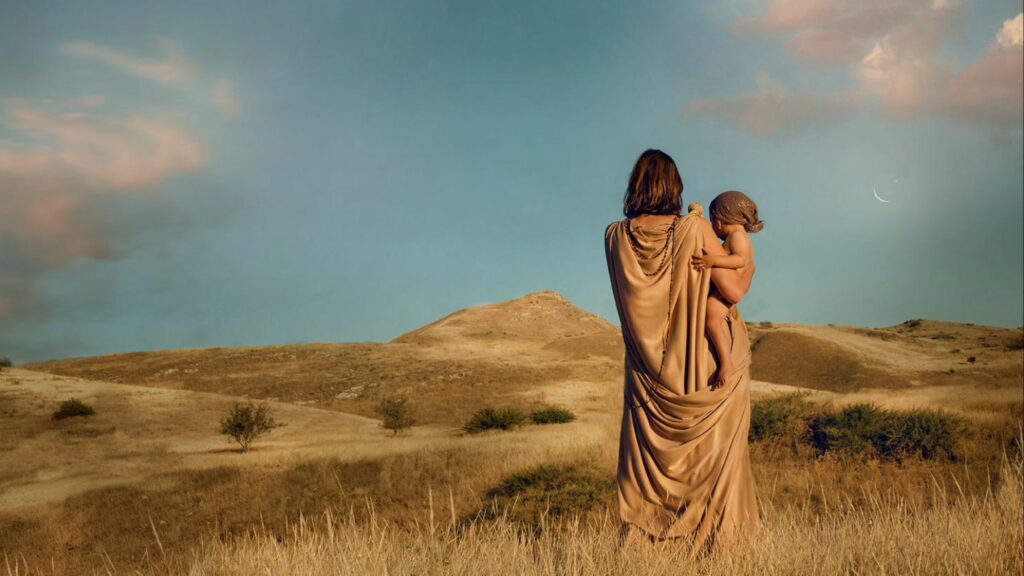
Into The Desert, Again
After Hagar’s return and Ishmael’s birth, Sarah would become pregnant and deliver a son, Isaac. Just as God had promised (Genesis 21:2). All the scheming and coercing had been completely unnecessary. God’s plan for Abraham and Sarah would come to pass because God is true to His word, and He is faithful to complete His good work. Had Sarah and Abraham waited on God, they would have spared themselves, and Hagar, the distress, drama, and tension that hung over their dysfunctional family structure as a consequence.
In Genesis 21:8-10, a feast is held in Isaac’s honor, and there Sarah witnesses Ishmael mocking Isaac. So Sarah said to Abraham, “Drive out this slave with her son, for the son of this slave will not be a coheir with my son Isaac!” Whenever we take matters into our own hands and strive to accomplish God’s work in our own time, we usually end up making a mess of things. Sarah’s impatience had led to decision making that would leave her home rife with conflict. The result of playing with people’s lives is never pretty.
Abraham loved Ishmael and he was distressed by Sarah’s request. Still, God spoke to Abraham, reassuring him and instructing him to take Sarah’s words to heart. So Abraham rose early in the morning, put bread and a skin of water on Hagar’s back, and sent her and her son away.
Did this mean that God wanted to punish Hagar and Ishmael? Or that God’s promise to Hagar is now void because of this incident? No. God, in His wisdom, would allow these two women and their families to go their separate ways. He would fulfill His covenant to Abraham and form the nation of Israel through Isaac, as He had always predestined.
Sometimes when God is refining our lives and delivering us from the toxic cycles we have found ourselves in, He asks us to make clean breaks. For some, it is leaving a controlling church. For others, it is abandoning a lifestyle or habit that has hindered us from being able to walk in the path that God intends for us. Whatever it may be, it can look differently for each of us.
Abraham and Sarah’s choices had caused chaos for all parties involved; the history between these three had layers of complicated emotions and events as they continually dealt with the fallout of their own failures. In addition to this separation being a measure for their own good, God also allows it because He is demonstrating that His work stands alone. We cannot attain the work of the Spirit through our own means, which is exactly what Abraham and Sarah had attempted. Therefore God guides Hagar’s departure in order to make clear the distinction between His sovereign designs and man’s feeble plans.
But where does this leave Hagar? What was Hagar’s reward for her obedience to God, ergo her submission to Sarah? She and Ishmael are thrown out of the camp and cast into the wilderness.
Abraham was a wealthy man. He owned gold, silver, livestock, and servants. Why did he send his son and the mother of his child into the desert with nothing but a loaf of bread and a single wineskin filled with water? In my research, I found that many pastors and biblical commentators theorize that Abraham sent Hagar out with such meager provisions as an act of faith. They conclude that Abraham knew Hagar would have to rely on the Lord for provision, and as long as God was with her, everything would turn out alright.
Respectfully, I disagree.
God did indeed tell Abraham to heed Sarah in sending Hagar away, but nowhere does He instruct Abraham to do so in such a manner. This was not an act of faith; this was neglect.
The habit of justifying the unjustifiable is one that pervades the church. Our willingness to participate in church environments where spiritual abuse is taking place, as long as the means justify the end, is an epidemic that costs the spiritual lives of believers. Even this hesitation to address Sarah’s cruelty and Abraham’s negligence towards Hagar speaks of church culture’s tendency to sugarcoat the misdeeds of Godly men and women. This can be particularly true when it comes to the highest levels of leadership. Where did this impression come from that there is some sort of enlightened state of leadership where one is no longer capable of sin or even being wrong?
Peter was an apostle that literally walked with Christ; he was personally discipled by, and did life with, God Incarnate for three years. He was instructed to build the church and was given authority by the Chief Cornerstone, yet none of these things stopped him from sinfully practicing racial segregation within the Body. It was Paul, the former hunter and persecutor of Christians, that publicly confronted Peter and charged him to repent. If the Apostle Peter is capable of sinning against the very sheep Christ asked him to love; if King David, a man after God’s own heart, is capable of committing adultery and murder; if Abraham, the father of Israel, is capable of the exploitation and abuse of a young girl, what makes any of us believe that we are the exception to sinful human nature?
Since we are not God and are therefore imperfect, we are all, each and every one of us, whether believer, unbeliever, or deconstructor, bound to hurt and fail others. For those of us in ministry, where so much of our work is interpersonal, it is not a matter of if, but a matter of when. We must remember that God and His Word are inerrant; we as His people, are not.
So the question is, how will we respond when we do cause hurt or harm to those we have been instructed to love? Will we walk in the humility and repentance that every disciple of Christ is called to, or will we dismiss the pain of others?
Oftentimes within church settings, the wounded who express their pain are made to feel as if they are the problem. If we ever hope to reconcile those who have walked away back into the house of God, then we have to get better at taking their hurt seriously. We must be willing to have hard conversations and self reflect on the ways where the church has failed. When we sugarcoat, deny, and gaslight the pain-filled experiences of our former brothers and sisters, we only further the gap between us.
Hagar vs. Sarah
Paul references Sarah and Hagar in Galatians 4, writing that one of Abraham’s sons (Ishmael) was born from a slave and the other (Isaac) was born of a free woman, this being a picture of the work of the flesh vs. the work of the Spirit.
Sometimes we can look at phrases like “the work of the flesh” and automatically associate this with carnality or sinful lifestyle. However, in this section, Paul isn’t highlighting the difference between the church and the world.
Rather, the context of this passage is that Paul is addressing circumcision within the church, specifically Jewish Christians who placed the requirement of circumcision on gentile Christians. Their requirement for circumcision reflects our human proclivity to rely on a system rather than trusting in Christ. Circumcision may no longer be the hot topic it was in Paul’s day, but our inclination to fixate on our own tactics and capabilities to do the work of God remains an issue. When our dependency on the Holy Spirit is replaced with operating out of our own wisdom, our years of experience, our successes, our methodologies, or the instructions of our spiritual heroes, we enter into the territory of the works of the flesh. And this is when people become collateral damage in the church.
Our tendency to categorize in black and white can make us see Sarah vs. Hagar as Good vs. Bad.
Yet, the contrast of Hagar and Sarah is not an indictment of Hagar’s character. Rather it is a visceral picture of what happens when God’s people rely on our own means and our own righteousness in order to accomplish or carry out His work. In Galatians 5, Paul even goes so far as to refer to those who put their hope in circumcision and works as alienating themselves from Christ, and fallen from grace.
Remember it is by grace that we have been saved. It is the gracious love of God that draws the hardened heart to repentance. It is with grace that we have been instructed to speak to one another and conduct ourselves (Colossians 4:6).
Grace is not something that we can create or mimic; like love, it it the fruit of the Holy Spirit at work in our lives. When we are no longer reliant on the Holy Spirit, we become void of authentic, God-given grace.
If our church environments lack grace, it no longer matters how sound our theology may be. Growing numbers, trendy aesthetics, dynamic stages, and worship production that could rival Bethel itself, cannot duplicate the work of the Spirit. Naturally these are not negative things in and of themselves, but if our focus becomes the methods rather than the Saviour, we have lost our way. When our eyes are set on results, rather than Jesus, we will soon find ourselves misrepresenting Him.
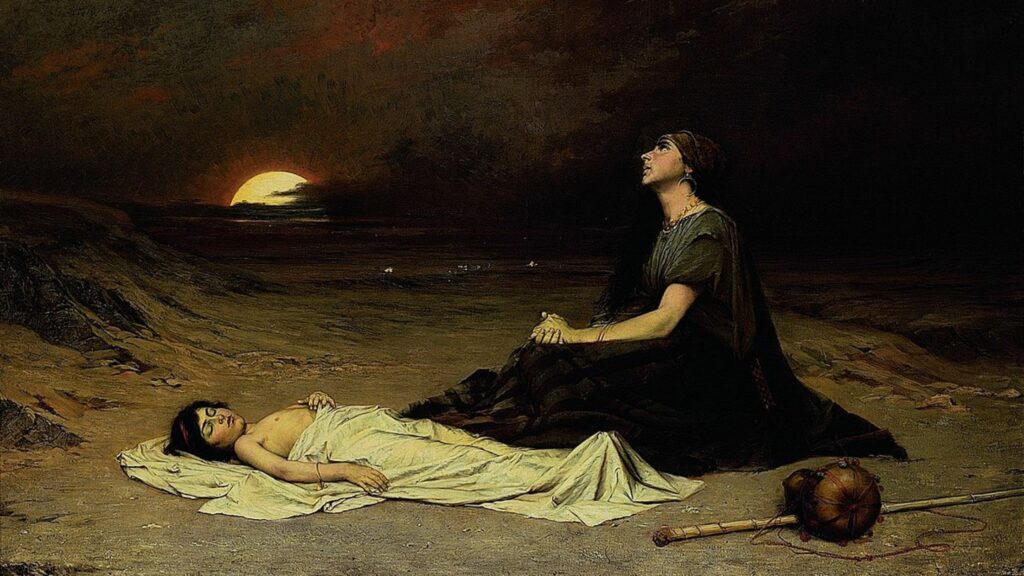
A Light That Shines Into the Darkness
From a deconstructing perspective, it might be upsetting to some that Abraham and Sarah still received the promises and blessings from God despite their behaviour towards Hagar.
Consider this, we know that we are all prone to make mistakes. Aside from Jesus, there is not a human alive, past or present, who has been able to live a flawless life. When we meet our last day on this earth, looking back, there will have been circumstances where we were wronged, and there will be circumstances where we did wrong.
The inescapable fact is that, in this life, there are times when we are Hagar, and there are also times when we will be Sarah.
The beauty is that God had mercy for both. In fact, God fulfilling His promise to Sarah and blessing her despite her sins is actually good news for us. It shows us that there is nothing that we can do, no sin too awful or failure too exceeding, that can hinder the lovingkindness of God. That is actually one the key components of the Gospel.
As for Hagar …
When last we saw her, she and Ishmael had been sent away with minimal provision, and Genesis 21:15 tells us that while she and her son were wandering the desert, their water ran out.
There are very few things in the human experience more devastating than a mother bearing the death of her child. Of all the pain that Hagar has endured in her life, this is, by far, the worst. Hagar is facing a living nightmare.
Every parent has cherished memories of their children. The small moments spent with our newborns are particularly precious. When night bled into the wee hours of the next morning and time was indistinguishable, when all the world was quiet, but for the tiny breaths joined by the rise and fall of the little chest in our arms, exhaustion could not damper the sense of awe and consuming love we felt. We cannot tell you what the dates were or what may have unfolded throughout the rest of our day, but we can vividly recall the hours spent staring into those big eyes looking back up at us; the wispy eyelashes, the squishy cheeks, the sweetness of their little baby scent, and the grasp of their tiny fingers wrapped around our own.
I wonder if these treasured memories served as pangs, tearing Hagar’s heart apart as she watched her son languish from hunger and dehydration. When both their bodies slowed from fatigue, and her once healthy boy grew feeble, did she replay the memories of his infancy and childhood in her mind while grieving that her son’s life would be cut so short?
Yet again, Hagar is powerless. She was powerless in her subjugation. Powerless in the nature of Ishmael’s conception. Powerless in the face of Sarah’s abuse. Powerless in the loss of her home and safety. Now, she is powerless in the imminent death of her child.
Hagar lays Ishmael down beside a bush and walks away. Do not mistake this as lack of feeling. Here is a human being who has been shattered to their core. Hagar withstood a lifetime of suffering upon suffering, but at this moment, something inside her broke. She genuinely cannot cope. If there was ever a description of an emotional and mental breakdown in Scripture, this is it.
In her anguish, Hagar sat at a distance, with her dying child in sight, and said, “I cannot bear to watch the boy die”… and wept.
When we refer back to Genesis 16, we remember that God had met Hagar in a similar desert, in a similar situation, and there He had made her a promise. For us it’s only been five chapters, but for Hagar it had been a matter of years. Yet, as we saw with Sarah and her old age, when God makes a promise there is no circumstance too impossible, no disaster too great, and no length of time that can make God forget His promises.
Genesis 21:17 says “…God heard the boy crying, and the Angel of God [Jesus] called to Hagar from heaven and said to her, ‘what’s wrong, Hagar? Do not be afraid, for God has heard the boy crying from the place where he is. Get up, help the boy up, and grasp his hand, for I will make him a great nation.’”
God then opens Hagar’s eyes and reveals a nearby well. Hagar fills her wineskin with water and brings it to Ishmael to drink. Either the well was a supernatural provision in that moment of need. Or, God had sustained Hagar and Ishmael, allowing them to continue, leading them as they unknowingly wandered to the exact location of an underground water source in the middle of the desert. Regardless of the how, God delivers Hagar once more and keeps His promise.
Note that the Angel of the Lord personally intervenes to rescue Hagar’s life not once but twice. Hagar was a slave, a woman, and the citizen of a pagan nation, all attributes that would have diminished her worth in the eyes of those around her. Yet, her name appears among the likes of Abraham, Moses, Gideon, David, and Elijah as one who encountered the Son of God, before He was ever called Jesus.
What does this say about God’s heart for the abused and the unseen?
Hagar would settle in the desert of Paran, her son would grow in the wilderness, becoming an archer and eventually, the father of the Arab nation. Though something about Hagar’s fate might not feel as satisfactory. Abraham and Sarah received blessings, wealth, descendants, and everything they had hoped for. Meanwhile, Hagar would spend her days in the sandy wastelands, seemingly forgotten. Once again, Hagar’s outcome does not seem very fair.
But what does Hagar obtain out there in her solitude?
What does she receive that had previously been denied to her, for possibly, her whole life? Her freedom.
To the enslaved and the oppressed, what is more precious than freedom?
God took the desert of Hagar’s exile, and turned it into a sanctuary.
Hagar may have been failed by a man and woman who walked with Yahweh, yet Jesus was sovereign.
Isaiah 61 is perhaps one of the most impactful portions of Scripture in my life. It is a text that I have hidden in my heart for many years. Take a moment to weigh these prophetic words of Isaiah as He describes the mission of Jesus:
The Spirit of the Lord God is on me,
because the Lord has anointed me
to bring good news to the poor.
He has sent me to heal the brokenhearted,
to proclaim liberty to the captives
and freedom to the prisoners;
to proclaim the year of the Lord’s favor,
and the day of our God’s vengeance;
to comfort all who mourn,
to provide for those who mourn in Zion;
to give them a crown of beauty instead of ashes,
festive oil instead of mourning,
and splendid clothes instead of despair.
And they will be called righteous trees,
planted by the Lord
to glorify him.
In Indigenous culture, we have a name for Jesus. You can find it in the First Nations Translation of the New Testament (FNV). We call Him Creator Sets Free. Jesus met Hagar in her darkest hours and exchanged her suffering for salvation. He did not stop there; after salvation, came freedom. He is the Creator who sets free. It is His nature. He is the God who is able to take our pain, our trauma, our wounds, all that was intended to destroy us, and somehow bring us to the other side, providing life, healing, comfort, and freedom, if we put our trust in Him.
To the church: Let us be a people who remember the grace that met us in our own wilderness. Let us seek to live our lives by that same grace as we interact with those both inside the church and out—a feat only possible when our eyes are set on Jesus, and our hearts are submitted to the Holy Spirit.
To those deconstructing: Like Hagar, you may have been wounded in the places and by the very people meant to represent the heart of God. Instead you experienced the sting of sinful humans sinning. Your pain is valid, and God sees. His desire is to meet you in the confusion, the frustration, the bitterness, the untangling, and the deconstructing.
Hagar put her trust in God. Though she may not have felt warm fuzzy feelings towards those who hurt her, it did not stop her from recognizing the character of God. The tragedy is that when man’s moral failures cause us to mischaracterize God, we can end up running from the arms of the very One whose love for us is infallible.
If those in the church who have lost sight of Jesus cause harm to others around them, and those who have been harmed lose sight of Jesus in the midst of their pain, we end up with a great deal of people from both sides, living a life devoid of the joy, restoration, and hope, that only Jesus can bring.
If there is one thing that we should be able to agree on in 2023, it is that this world is a dark place. There is suffering in every corner. Atrocities are committed inside the church and every other community outside of it. These are all reflections of sinful human nature.
John 1 says that in the beginning was the Word, and the Word was with God, and the Word was God, and that in Him was life, and that life was the light of men. And the light shines into the darkness, and the darkness has not overcome it.
Jesus is at work in the world, just as He is at work in our lives. Unlike us, Jesus is the embodiment of all things good, Holy, and righteous.
We can and should examine church culture and norms. We can and should hold pastors and leaders accountable. We can and should leave church environments where leadership abuse their position and corrupt the Body.
Yet, if I can, I urge you, in all these things, hold fast to Jesus.
Jesus does not manipulate, He redeems. Jesus does not control, He sets free. He does not abuse, He restores. He does not condemn, He forgives. He alone is worthy; not nations or leaders, ideologies or influencers. In this world of overwhelming injustices, Jesus is the One who brings light into the darkness. He is El Roi, the God who sees.
And just as He saw Hagar in her hour of need, He sees you.









